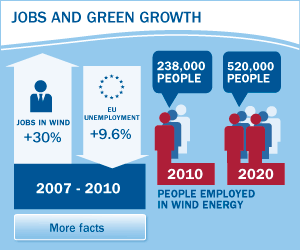Cutting renewables support to increase competitiveness is nonsense
 Those European countries which have cut support schemes for renewable energy, have – just like Professor Butler writing on an FT blog yesterday – jumped to the wrong conclusion.
Those European countries which have cut support schemes for renewable energy, have – just like Professor Butler writing on an FT blog yesterday – jumped to the wrong conclusion.
“Competitiveness is the watchword of the moment. Recession and unemployment are the crises which require attention”, the Professor writes. Yes indeed. Yet withdrawing public support for wind energy and other renewables to boost competitiveness, to tackle recession and unemployment is as illogical as eating an orange a day for your health – and stopping as soon as you get a cold.
The renewables sector employs over 1.2 million people in Europe. Wind energy alone contributed €32 billion to the EU economy in 2010 and employs well over 200,000 people in Europe. Europe is a net exporter of wind energy technology. Support for renewables is support for European jobs; a European industry and European growth.
Removing that support destroys those jobs and industrial leadership – in Spain, over 20,000 jobs have been destroyed between 2008 and 2010 due to the retrospective changes introduced in 2010. Moreover, it means Europe has to get its power from elsewhere: yet more polluting coal and gas; yet more money handed over to Russia, Algeria and other exporters.
“In Germany the mood has shifted decisively against more costly renewables”, Professor Butler claims. More costly than what? “Renewables will reach cost parity with conventional fuels (including gas) in many parts of the world in the very near term”, says Citibank. Wind energy is already far cheaper than nuclear, coal – if you count the €42.8 billion annual health costs – and increasingly competitive with gas.
Finally, those governments who are changing their support for renewables should bear in mind where public money is really going: OECD figures show that coal, oil and gas in the UK were subsidised to the tune of £3.63 billion in 2010, while onshore and offshore wind received only £700 million in the year to April 2011 – that’s more than five times less than fossil fuels. Moreover, International Energy Agency figures show that coal, oil and gas subsidies in 37 countries received a total of $409 billion in 2010, compared to $66 billion for renewables.






